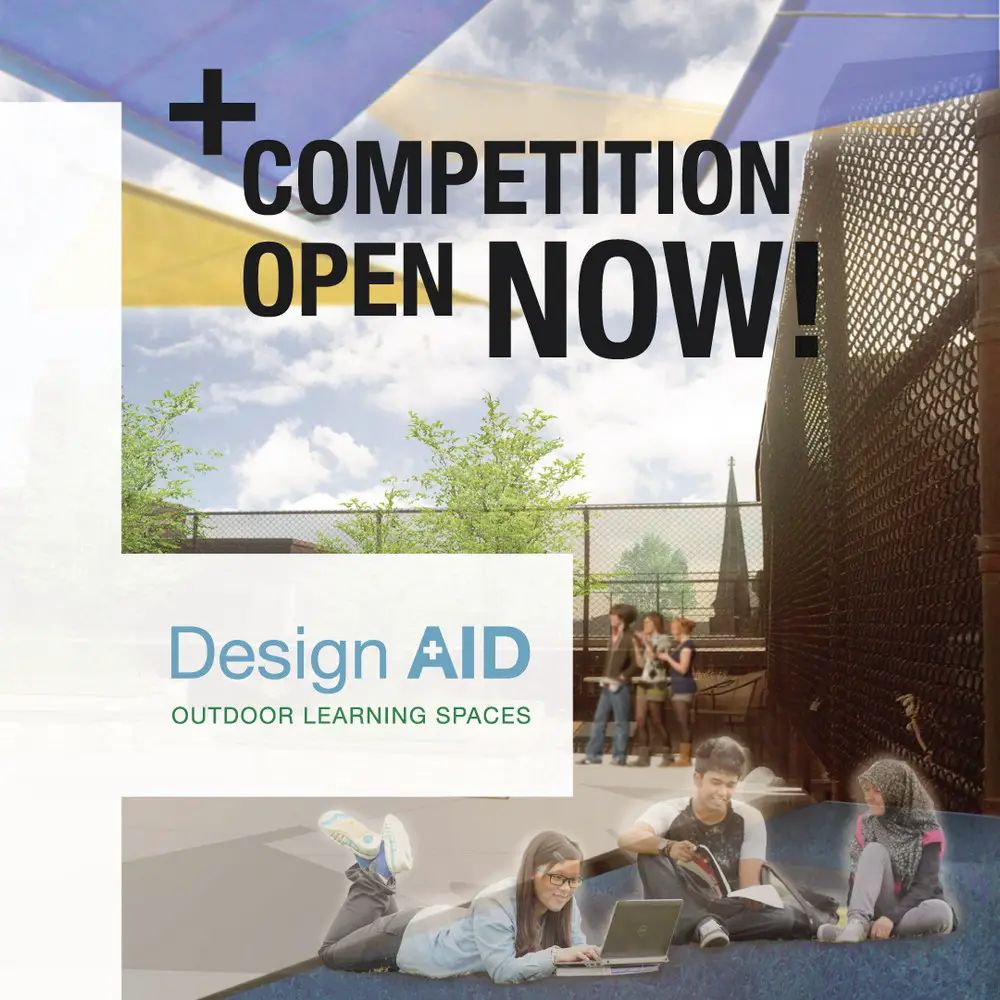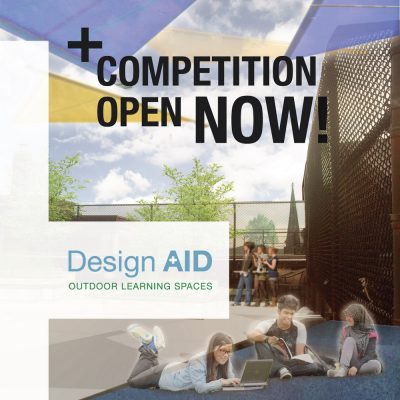Design AID: Outdoor Learning Spaces Competition News, Architecture Contest 2020
Design AID: Outdoor Learning Spaces Competition
August 18, 2020
Design AID: Outdoor Learning Spaces Open Call
Design AID: Outdoor Learning Spaces Design Ideas Competition, PA, USA
How can communities turn underutilized schoolyards into outdoor classrooms that could enable students to safely return to school? The Community Design Collaborative, in partnership with the School District of Philadelphia, invites designers to submit ideas for outdoor learning spaces that can be easily and inexpensively implemented by schools in Philadelphia and beyond.
The Community Design Collaborative will compile all feasible design solutions in the Design AID: Outdoor Learning Spaces Design Guide that will serve as a digital resource to support Philadelphia schools and schools across the U.S. and the globe in their efforts to safely go back to school. The School District of Philadelphia will use the design guide to implement 5-6 pilot learning spaces at Philadelphia schools this fall.
The competition opens Friday, August 14, 2020 and the deadline for submissions is Sunday, August 23, 2020. The digital design guide will launch Monday, September 14, 2020. More information is available at www.cdesignc.org/outdoor-learning.
Further Details:
Students haven’t seen the inside of a classroom for months and they’ve been missing in-person interaction with their teachers and peers. They’ve tried school on a screen, but it’s just not the same.
How can schools turn underutilized schoolyards into outdoor classrooms that could enable students to safely return to school?
As school districts and parents all over the country are contemplating the possible scenarios for returning to school, history indicates that we should be (re)turning to the outdoors for answers. With funding from the William Penn Foundation, and in partnership with the School District of Philadelphia, the Community Design Collaborative’s Design Assistance In Demand (A.I.D.): Outdoor Learning Spaces Design Ideas Competition is seeking your innovative and creative solutions for outdoor learning in a time of global crisis — and beyond — to bring all of our students back to school as soon as safely possible and to expand opportunities for learning in the extended future.
School buildings have a limited amount of square footage to address the proper social distancing necessary for all students to return to school, so we are looking to utilize the typically underused footprint of schoolyards to expand learning environments to the outdoor classroom. While this challenge is not site specific, design solutions should be considered for typical paved schoolyards. Designs can address a range of interventions, from the simple idea of bringing existing classroom furniture outdoors to a kit of parts that can be mixed and matched in various schools and sites, and may be constructed by school and community volunteers.
WHO CAN PARTICIPATE?
Anyone can participate! And everyone’s a winner!
The Community Design Collaborative will compile
your design solutions in the Design A.I.D.: Outdoor
Learning Spaces Design Guide that will serve as a
digital resource to support Philadelphia schools
and schools across the U.S. and the globe in their
efforts to safely go back to school.
HOW TO PARTICIPATE?
Entrants will design an outdoor learning space
and create for submission (1) main concept image
accompanied by a concise (150 word) concept
description. In addition, entrants can create up to
12 supporting images and/or text components that
provide clear instruction about materials needed to
construct, install, and maintain the proposed design.
TIMELINE
Friday, August 14
Competition opens.
SUNDAY, AUGUST 23
Deadline for submissions.
Due by 11:59 PM EST
MONDAY, SEPTEMBER 14
Digital Design Guide launched.
SEPTEMBER – OCTOBER
Outdoor learning spaces
installed at 5-6 schools.
Early November
Virtual presentation of
completed projects.
DESIGN GUIDELINES
Successful designs must reflect the Design
Goals, Design Parameters and Public Health
Recommendations as outlined in the following
pages of this brief.
Additional considerations and resources are also
included. However, while you may use these to
guide your work, it is not necessary to address all
of them in your submission.
While the designs will be evaluated for inclusion
in the Design Guide based on compliance with the
Design Goals, Design Parameters, and Public
Health Recommendations, they will also be
considered based on creativity and innovation.
So, please BE CREATIVE!
Medium, technique, and vantage point of drawings
are determined at the discretion of the entrant.
However, drawings and supporting information must
be clear and comprehensive for all audiences, not
only designers.
HOW TO SUBMIT
To submit your design solution, please prepare
the following materials for submission:
– Name of Designer / Design Team or Firm
– Names of individual team members
– Designer / Design Team or Firm
contact information
– Title of Design Solution
– One (1) main concept image of your design
solution. File must be as close to 300dpi
and no larger than 5MB.
– 150 word narrative that describes your
design solution and how it addresses the
design criteria.
– Design Guide page with one (1) main concept
image, three (3) supporting images, and
narrative. File must be a PDF no larger than
5MB, download Design Guide template: https://cdesignc.org/uploads/files/298472690226117404-designaid-outdoorlearningspaces-submissiontemplate.pdf
– Design Details page with up to eight (8)
images and/or text components that provide
clear instruction about materials needed to
construct, install, and maintain the proposed
design. File must be a PDF no larger than
5MB, download Design Details template: https://cdesignc.org/uploads/files/44588590331044347-designaid-outdoorlearningspaces-designdetails-submissiontemplate-081420.pdf
– Design assembly difficulty level: no tools,
hand tools, power tools, or specialized skills.
– Total number of hours spent by all team
members on the design of your submission.
This information is intended to document the
overall value of pro bono service provided
through this design competition.
– Social media handles
– Website, if applicable
– Non-refundable entry fee of $25 (per entry).
100% of this fee (and any additional donation)
will fund the construction of additional
outdoor learning spaces in School District
of Philadelphia schoolyards, providing more
opportunities to our school children beyond
the funded 5-6 pilot outdoor learning spaces
through this effort.
Designers / design teams may submit multiple
design solutions, however, each must be submitted
as a separate entry submission.
Submit your outdoor learning space idea here:
https://cdesignc.org/outdoor-learning
THE PANEL
All design submissions will be reviewed by a panel
of members of the School District of Philadelphia,
Playful Learning Landscapes, the Community
Design Collaborative and traditional and
community educators.
All competition submissions will be reviewed
and evaluated for inclusion in the Design Guide
based on compliance with the listed criteria of
Design Goals, Design Parameters and Public
Health Recommendations.
Additionally, School District of Philadelphia students
and their families may review the submissions to
select their top 10 favorite submissions, which will
receive a gold star designation in the Design Guide.
IMPLEMENTING PILOT LEARNING SPACES
This initiative intends for 5-6 pilot outdoor learning
spaces to be implemented through funding from
the William Penn Foundation for this Design Ideas
Competition. The beneficiary schools will be
selected by the School District of Philadelphia with
a goal of serving those schools most in need. These
schools will, hopefully, be catalysts, encouraging
other schools to implement their own outdoor
learning space.
Design Goals
DESIGN SOLUTIONS ARE TO BE:
– Welcoming, safe, accessible, and equitable
– Vibrant, intriguing, and playful
– Supporting teacher-student interactions
– Spaces that foster learning (all components/
aspects of the design should strive to
incorporate opportunities for learning, i.e.,
if there is a roof element, it can incorporate
a system of rain collection to teach about
stormwater management)
– Inclusive of all modalities of learning:
kinesthetic (moving), visual (seeing), auditory
(hearing), and tactile (touching)
– Appropriate for elementary (K-5) schools
with special focus on the youngest students
in grades K-3
– Promoting creativity and ingenuity in children
Design Parameters
DESIGN SOLUTIONS ARE TO:
– Be fabricated and installed for $5000 or less
– Easily fabricated and assembled quickly by
volunteers (ideally with assistance
from students)
– Be temporary, yet inspiring the potential for
permanent installations.
– Accommodate year-round learning
(all four seasons)
– Be low maintenance (in ease and cost)
– Make creative use of everyday materials and
items prioritizing the use of durable, reusable,
and sustainable materials
– Maximize accessibility throughout the site
for all abilities
– Meet minimum code requirements for
structures, railings, ramps, surfaces, etc.
– Consider a menu of design elements that are
versatile and can be configured to the needs of
multiple sites
– Accommodate clear lines of sight for supervision
of a 30-student class by teachers
– Include opportunities for smaller groups or
individual learning
– Integrate power, water, and wifi, as possible
– Be easily secured (security in some cases may
be provided by an existing fence surrounding
the schoolyard)
– Include opportunities for storage, writing and
tackable surfaces
– Consider the design for one classroom and/or
how multiple classrooms may be arranged within
one schoolyard space
Public Health Recommendations
DESIGN SOLUTIONS ARE TO:
– Incorporate public health guidance from
the local, state, and federal requirements to
maintain the health and safety of school
staff and students.
– Follow CDC guidance for schools, City
of Philadelphia Reopening Guidance for
Elementary Schools (English) (Espanol), and
the School District of Philadelphia Public
Health Guidance for COVID-19.
– Embrace the Guiding Principles of Inclusive
Healthy Places. These guiding principles
can inform strategies for shaping public
space projects that promote accessibility
and diverse social interactions, reflect shared
social values, advance equity, and are
welcoming for all.
SUGGESTED STRATEGIES MAY INCLUDE:
– Seating that supports physical distancing and
universal design for all abilities
– Proper signage for physical distancing that
includes information on how to stop the spread
of COVID-19. All signage should be available in
languages appropriate to the host community
– Touchless hand-washing locations and
automatic dispensers for hand sanitizer
Additional Considerations
PLANNING & ACCESS
Design teams may review and use the following
considerations to guide their designs, but are not
required to address them in their submission.
– Designs should consider impact on
surrounding residential areas.
– Designs are to be attractive and add to
the overall look and appeal of the school
and grounds.
– Designs should consider protection from
surrounding vehicular traffic.
– Grade should be maintained, or changes
should be easily navigable without gaps
or steps.
– Designs should account for heavy traffic/usage.
– Designs should consider the increased
need for bike or scooter parking within the
schoolyard space.
PLAYFUL LEARNING
Playful Learning Landscapes uses an evidencebased approach that harnesses guided play in
spaces designed for children to discover,
explore, and learn.
Entrants should consider using designs that:
– Encourage children to engage in the type of play
known to support learning (i.e., joyful, meaningful,
actively engaging, and socially interactive)
– Incorporate 21st century learning goals (i.e., 6 Cs;
communication, collaboration, content, critical
thinking, creative innovation, and confidence)
– Include elements that spark conversation and
enriching interactions
– Integrate, where possible, elements of community
culture and identity
***
THE FINE PRINT
The Design A.I.D.: Outdoor Learning Spaces Design
Ideas Competition is organized and administered by the
Community Design Collaborative in partnership with The
School District of Philadelphia (The Partners). The goal of
this outdoor learning space initiative is to develop a Design
Guide that Philadelphia schools can adapt for use at their
specific sites with the support of their students, families,
and neighbors.
All competition submissions shall be vetted by The Panel
for eligibility and adherence with the design criteria in the
competition brief. All design solutions adhering to the
listed design criteria will be published in the Design A.I.D.:
Outdoor Learning Spaces Design Guide. Decisions
of eligibility will be at the discretion of The Panel and all
decisions are final. The Panel and Partners reserve their
right to refuse any entry.
By submitting an entry to this competition, the designer/
design team represents that all work submitted is the
original work of the designer/design team. The Partners
shall not be responsible for any misrepresentations,
disputes, or other concerns associated with the authorship
of the submissions. The Partners reserve the right to
publish and/or reproduce images and text from any and
all submissions, with credit to the creator(s). By submitting
an entry to this competition, entrants transfer unlimited
use for publication, exhibition and electronic posting of all
entries to The Partners, and entrants acknowledge and
accept that all aspects of any submission may be used
for publicity purposes.
The Partners shall not be responsible for any technical or
other conditions that prevent the receipt or evaluation of a
competition submission, or any part thereof.
Entrants agree to release, indemnify, defend, and hold
harmless The Partners and their respective directors, officers,
employees, and agents from and against all claims, liens,
demands, causes of action and suits and all losses, damages
and expenses, including without limitation reasonable
attorneys’ fees, in any manner connected with entrants’
participation in the competition.
Upon submitting an entry to this competition, all entrants
agree to waive any and all claims against The Partners in
connection with the competition. The Partners shall not be
responsible for evaluating the soundness of any entry for
construction or safety purposes, including without limitation
with respect to any public health requirements.
***
With funding from the William Penn Foundation, and in partnership with the School District of Philadelphia, the Community Design Collaborative is seeking innovative and creative solutions for outdoor learning in a time of global crisis – and beyond – to bring students back to school as soon as safely possible and to expand opportunities for outdoor learning in the future.
School buildings have a limited amount of square footage to address the proper social distancing necessary for all students to return to school, but the typically underused schoolyard can be used to expand learning environments to the outdoors. Open-air classrooms were used to prevent the spread of tuberculosis in the early 20th-century, and outdoor learning has been shown to have physical, emotional, and social benefits for kids.
Architects and designers are encouraged to submit ideas for outdoor learning spaces that can be easily and inexpensively implemented by schools in Philadelphia and elsewhere.
Anyone can participate! And everyone’s a winner! The Community Design Collaborative will compile all feasible design solutions in the Design AID: Outdoor Learning Spaces Design Guide that will serve as a digital resource to support Philadelphia schools and schools across the U.S. and the globe in their efforts to safely go back to school. The School District of Philadelphia will use the design guide to implement 5-6 pilot learning spaces at Philadelphia schools this fall.
Community Design Collaborative
a: 1218 Arch Street, Philadelphia PA 19107, USA
Design AID: Outdoor Learning Spaces Competition images / information received 280720
Architectural Competitions
Current / Recent architectural contests on e-architect:
2A Continental Architectural Awards 2020
Network Rail Re-imagining Stations Competition
3rd Generation New Towns in Korea Design Contest
3rd Generation New Towns in Korea Architecture Competition
Tottenham Pavilion Competition
London Architectural Competitions
Main Library Gwangju Competition
LafargeHolcim Awards for Sustainable Construction
Flexible Housing Competition for Great Places Lakes & Dales Partnership
LFA 2020 Architecture Competition
US Architecture Design
Comments / photos for Design AID: Outdoor Learning Spaces Competition 2020 Open Call page welcome






